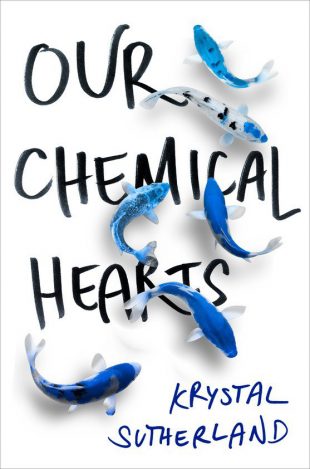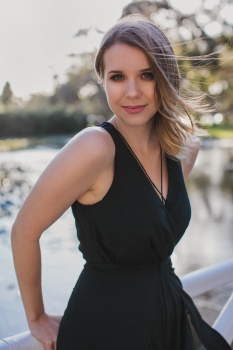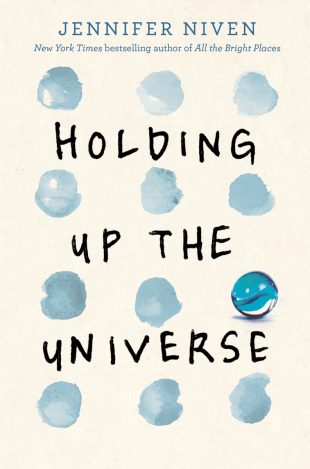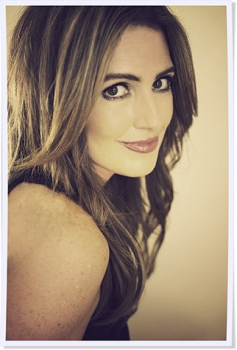Book Review: Our Chemical Hearts
 Our Chemical Hearts by Krystal Sutherland
Our Chemical Hearts by Krystal Sutherland 
Published by G.P. Putnam's Sons Books for Young Readers on October 4th 2016
Genres: Young Adult Fiction, Contemporary Fiction
Pages: 320
Source: Library
Amazon
Goodreads
Goodreads Synopsis: John Green meets Rainbow Rowell in this irresistible story of first love, broken hearts, and the golden seams that put them back together again.
Henry Page has never been in love. He fancies himself a hopeless romantic, but the slo-mo, heart palpitating, can’t-eat-can’t-sleep kind of love that he’s been hoping for just hasn’t been in the cards for him—at least not yet. Instead, he’s been happy to focus on his grades, on getting into a semi-decent college and finally becoming editor of his school newspaper. Then Grace Town walks into his first period class on the third Tuesday of senior year and he knows everything’s about to change.
Grace isn’t who Henry pictured as his dream girl—she walks with a cane, wears oversized boys’ clothes, and rarely seems to shower. But when Grace and Henry are both chosen to edit the school paper, he quickly finds himself falling for her. It’s obvious there’s something broken about Grace, but it seems to make her even more beautiful to Henry, and he wants nothing more than to help her put the pieces back together again. And yet, this isn’t your average story of boy meets girl. Krystal Sutherland’s brilliant debut is equal parts wit and heartbreak, a potent reminder of the bittersweet bliss that is first love.
MY REVIEW
Our Chemical Hearts is an engaging story about first loves. Author Krystal Sutherland takes her readers on a journey to explore the highs and the lows of falling in love for the first time. We follow Henry Page, a young man who has never been in love before. While finding the girl of his dreams is definitely on his radar, Henry is content for the time being to focus on his school work and on his work at the school paper. He has devoted himself to the paper for years and is hoping to land the Editor job as he begins his senior year. When he meets Grace Town, the new girl at school, however, his life is turned upside down. He wouldn’t have expected a girl wearing oversized boy’s clothing, with a bad haircut and questionable hygiene to be the girl of his dreams, but there’s just something about Grace and so he begins to pursue her, learning very quickly that there’s way more to Grace than meets the eye and much of it is tragic. Even though he senses the relationship is probably trouble, Henry falls head over heels for Grace anyway and so their roller coaster of a journey begins….
LIKES
I think Sutherland’s biggest strength in this novel is her ability to craft wonderfully complex, flawed characters that immediately grab your attention and your heart and don’t let go.
Henry. I loved Henry Page. He totally reminded me of someone I would have been friends with in high school or maybe even dated. He’s funny and charming in a semi-dorky kind of way, the word “adorkable” comes to mind actually. Henry has also never been in love before, so he has an innocent, almost vulnerable, quality about him that made me feel very protective of him, especially once he started falling so hard for Grace Town that he started to neglect his school work and his editorial duties at the school paper. Even though Henry could see that the relationship probably wouldn’t end well, he was still drawn to Grace like a moth to a flame. I knew he was in trouble as soon as he started snooping, and found Grace’s Facebook page. The Grace he sees on Facebook doesn’t even remotely resemble the Grace he knows. Facebook Grace is smiling, wearing feminine clothes, and looks like every bit the social butterfly. Henry is even more fascinated by Grace at this point and he becomes obsessed with trying to “fix” her.
It was so frustrating to watch him on the path he was on, but at the same time, it made his character feel all the more authentic because we’ve all been there at some point. You can’t help who you fall in love with, even if it’s just your idea of what that person should be, and sometimes broken hearts are a rite of passage when it comes to love and romance.
Grace. I can’t say that I loved Grace Town the way I loved Henry, but I was initially drawn to the same mysterious qualities about her that initially attracted Henry to her. Grace is an incredibly complex character, mainly because of all of the details about herself that she tries to hide from everyone around her. Like Henry, I found her fascinating and wanted to know more about her. The more I learned, however, the more my heart just broke for her. Her eccentricities are not just her trying to be quirky and mysterious, but instead run so much deeper than that. I don’t want to give away any specific details, but I will say that Grace has recently suffered a huge loss and that she feels so responsible for that loss that her life has become little more than her trying to atone for her “sin.” I was so torn about her relationship with Henry because even though he was neglecting his school work, etc, because of her, I could also tell that she desperately needed a friend and Henry is such a good guy that I knew he could have been a great friend to her. Just seeing their hilarious conversations on Facebook was proof of that. Even though Grace was still full of secrets, she still opened up to Henry more than she opened up to anyone else around her.
Henry’s Circle of Friends. As compelling as the two main characters were, I also adored Henry’s friends Lola and Murray. Not only were they wonderful friends to Henry, but they also provided a lot of levity to balance the seriousness of what was going on with Grace. Murray is from Australia and has found that doing endless Crocodile Dundee impressions surprisingly serves him quite well when he wants to woo the ladies. Lola works on the newspaper with Henry and their relationship is especially entertaining. Lola was the first girl Henry ever kissed and not too long after that moment, she came out and announced she was a lesbian. Ever since, they have had the long-running joke that Henry’s such a bad kisser that he turned Lola gay. I just loved the banter and the overall dynamic of this circle of friends, especially how they had Henry’s back when it came to Grace. They could tell the relationship was probably a bad idea but ultimately knew all they could do was be there for Henry no matter what happened. These friendships were probably what I enjoyed most about the book.
Henry’s Parents: Kind of a sidebar here, but if Henry is ”adorkable,” he definitely gets it from his parents. They were so cute and so corny. I loved it every time they turned up in the story, especially when they would go out of their way to embarrass Henry in front of Grace.
DISLIKES
I won’t really call them dislikes, but there were a couple of things about the story that knocked my overall rating down a little lower than it might otherwise have been.
Grace and Henry’s afternoon ritual. Once they start hanging out, every afternoon Henry walks Grace home, Grace then hands Henry the keys to her car and he drives them both back to his house. Then Grace leaves her car at Henry’s house and walks off in the opposite direction of where she lives, with no explanation as to where she’s going. It’s another mysterious to Grace, of course, and while it does end up being relevant to Grace’s backstory, I got a little bored reading about it day after day.
Grace’s living arrangements. It’s probably just me that felt this way, but I thought the mention of Grace’s awkward living arrangements near the end of Our Chemical Hearts made her story feel a little less believable. Up until that point, everything that had happened felt so completely authentic – an experience any of us could have. But then this implausible living arrangement was mentioned and we were unexpectedly given a tour of Grace’s home environment and that part just felt over the top to me. It didn’t ruin the story or anything but it just felt like an unnecessary dramatic element.
FINAL THOUGHTS
If you’re looking for a solid contemporary read about first loves, broken hearts, friendship, and the idea that you can’t choose who you fall in love with or how long that love may last, then definitely give Our Chemical Hearts a try. Even with the couple of issues I had with it, I still very much enjoyed the read overall.
RATING: 3.5 STARS


 Holding Up the Universe by
Holding Up the Universe by 
